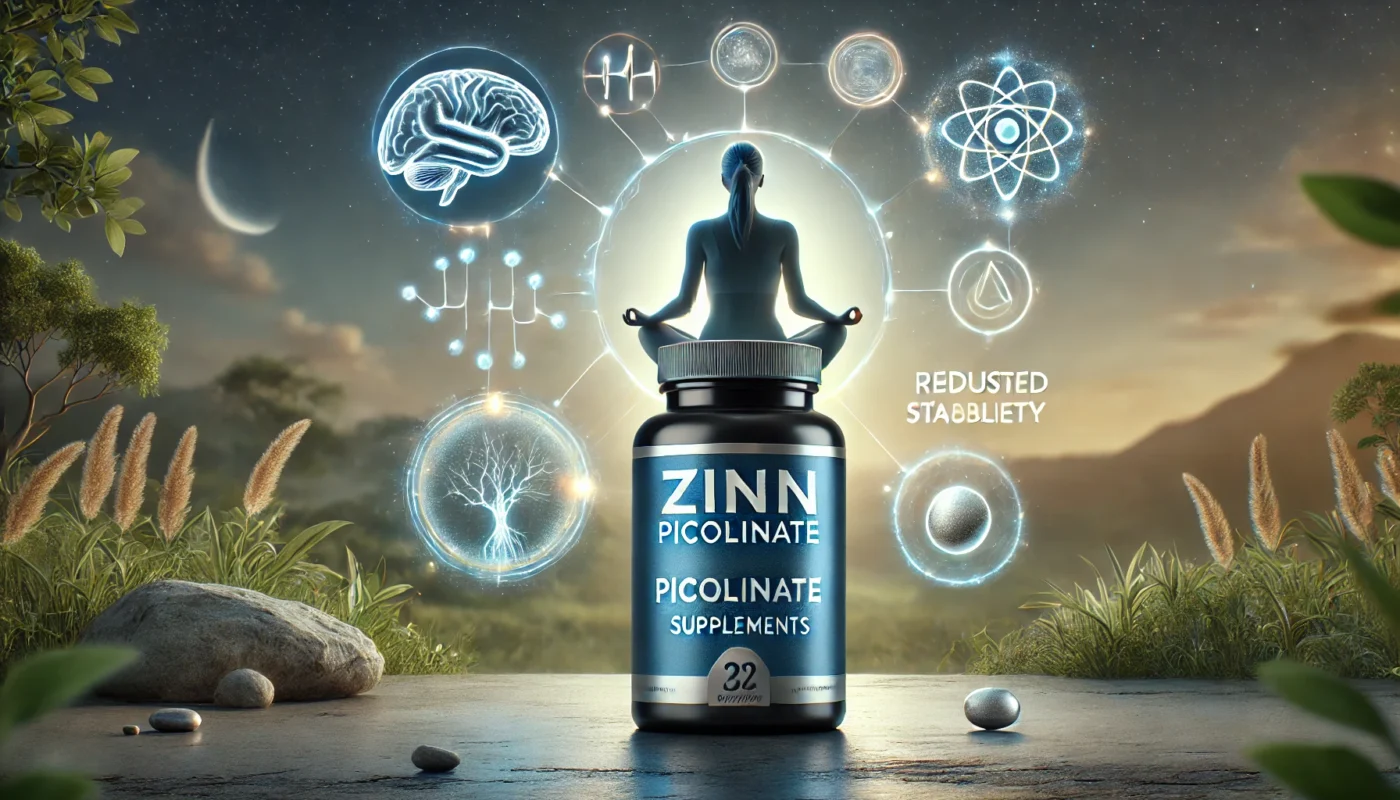Anxiety disorders are among the most common mental health challenges worldwide, affecting approximately 284 million people annually, according to the World Health Organization. These disorders disrupt daily life, impact physical health, and often require a multifaceted treatment approach, including therapy, lifestyle adjustments, and sometimes medication. Increasingly, research has pointed to the role of nutrition in managing anxiety, with zinc emerging as a critical player in mental health.
Zinc picolinate, a highly bioavailable form of zinc, supports the nervous system by influencing neurotransmitter balance, reducing inflammation, and improving brain function. This article explores the scientific evidence behind zinc picolinate’s role as a natural mood stabilizer and its potential to alleviate anxiety.
You May Also Like:
Zinc Picolinate for Seniors: Maintaining Immune Vitality
Zinc Picolinate for Healthy Aging in the Immune System: What You Need to Know
Zinc Picolinate and Anxiety: The Natural Mood Stabilizer is an original (HSLHealing) article.
Understanding Anxiety and Its Biological Basis
Anxiety involves excessive worry, fear, or unease, often accompanied by physical symptoms such as restlessness, increased heart rate, and difficulty concentrating. While anxiety can be triggered by external stressors, its biological basis lies in brain chemistry and neural circuitry.
Key Biological Factors in Mental Disorders:
- Neurotransmitter Imbalances: Low levels of gamma-aminobutyric acid (GABA) and serotonin can lead to overactivity in the brain, contributing to feelings of anxiety.
- Oxidative Stress: High levels of oxidative damage impair brain cell function, exacerbating anxiety symptoms.
- Inflammation: Chronic inflammation disrupts the hypothalamic-pituitary-adrenal (HPA) axis, which regulates the body’s stress response.
Zinc, as an essential trace mineral, plays a critical role in addressing these factors, making it a promising addition to anxiety management strategies.
Why Zinc Is Essential for Mental Health
Zinc is involved in several key processes that influence mood and mental stability:
- Neurotransmitter Regulation:
Zinc is required for the synthesis and function of neurotransmitters like GABA and serotonin, which promote relaxation and emotional balance. - Modulating the HPA Axis:
Zinc helps regulate the HPA axis, preventing excessive stress responses that can contribute to anxiety. - Reducing Neuroinflammation:
Zinc’s anti-inflammatory properties protect the brain from inflammation that disrupts normal signaling pathways. - Supporting Brain Plasticity:
Zinc contributes to neurogenesis and synaptic plasticity, helping the brain adapt to stress and recover from anxiety-inducing events. - Antioxidant Defense:
Zinc is a cofactor for superoxide dismutase (SOD), an enzyme that combats oxidative stress and protects neurons.
Promote emotional balance and mental clarity with Zinc Picolinate. Get yours on Amazon today.

What Is Zinc Picolinate?
Zinc picolinate is a chelated form of zinc in which zinc is bound to picolinic acid, enhancing its absorption in the gastrointestinal tract. This bioavailability ensures that more zinc reaches the brain and other tissues where it exerts its effects. For individuals experiencing anxiety, zinc picolinate provides a reliable and effective way to replenish zinc levels and support mental health.
How Zinc Picolinate Supports a Balanced Mental State
1. Regulating Neurotransmitter Activity
Zinc picolinate enhances the activity of GABA, the brain’s primary inhibitory neurotransmitter, and serotonin, the “feel-good” neurotransmitter. These chemicals play a central role in calming the brain and reducing anxiety.
- Study Insight: A study in Biological Psychiatry found that zinc supplementation increased serotonin levels and reduced anxiety-like behaviors in animal models.
2. Protecting Against Oxidative Stress
Oxidative stress damages brain cells and disrupts neural signaling. Zinc picolinate’s role in antioxidant defense helps preserve brain health and reduce anxiety symptoms.
- Research Finding: A study published in Neurochemical Research reported that individuals with anxiety had significantly higher oxidative stress markers, which were reduced following zinc supplementation.
3. Reducing Neuroinflammation
Inflammation in the brain contributes to anxiety by interfering with neurotransmitter pathways. Zinc picolinate’s anti-inflammatory properties protect against this disruption.
- Clinical Evidence: A study in Journal of Psychiatric Research found that zinc supplementation reduced levels of pro-inflammatory cytokines, improving symptoms in individuals with generalized anxiety disorder (GAD).
4. Modulating the HPA Axis
Chronic stress overstimulates the HPA axis, leading to heightened cortisol levels and increased anxiety. Zinc picolinate helps regulate this axis, promoting a calmer stress response.
- Study Finding: Research in Stress and Health demonstrated that zinc supplementation reduced cortisol levels in stressed individuals, alleviating anxiety symptoms.
5. Enhancing Neurogenesis and Synaptic Plasticity
Zinc supports the formation of new neurons and strengthens synaptic connections, improving the brain’s ability to adapt and recover from stress.
- Evidence: A study in Frontiers in Molecular Neuroscience found that zinc supplementation enhanced neuroplasticity, reducing anxiety behaviors in animal models.

Zinc Deficiency and Anxiety
Zinc deficiency is associated with an increased risk of anxiety and other mood disorders. Common causes of deficiency include poor dietary intake, chronic stress, and malabsorption disorders.
Symptoms of Zinc Deficiency:
- Persistent feelings of stress
- Difficulty concentrating
- Fatigue and low energy levels
- Weak immune function
Statistics:
- A study in Journal of Affective Disorders found that individuals with anxiety disorders were 37% more likely to have zinc deficiency compared to the general population.
Dietary Sources of Zinc
While zinc picolinate supplementation is highly effective, incorporating zinc-rich foods into your diet can further support mental health. Examples include:
- Animal-Based Sources: Oysters (highest natural source), beef, chicken, turkey, and eggs.
- Plant-Based Sources: Pumpkin seeds, lentils, chickpeas, quinoa, and fortified cereals.
For individuals with dietary restrictions or increased zinc needs, zinc picolinate offers a reliable alternative to ensure adequate zinc intake.
Recommended Dosage and Safety
The recommended dietary allowance (RDA) for zinc is:
- Adult men: 11 mg/day
- Adult women: 8 mg/day
For anxiety management, therapeutic doses of zinc picolinate often range from 20–30 mg/day. However, excessive zinc intake (above 40 mg/day) can cause:
- Nausea
- Reduced copper absorption
- Gastrointestinal discomfort
Note: Always consult a healthcare provider before starting supplementation to ensure proper dosage and safety.
Support your mental health naturally—order Zinc Picolinate supplements now on Amazon!

Integrating Zinc Picolinate into an Mood Management Plan
- Pair with Other Nutrients: Combine zinc picolinate with magnesium or vitamin B6, which also support neurotransmitter function.
- Adopt Stress-Reducing Practices: Incorporate mindfulness, exercise, and relaxation techniques to complement the effects of zinc.
- Track Progress: Monitor changes in mood, energy levels, and stress symptoms to assess the effectiveness of supplementation.
Future Research Directions
While current evidence supports zinc picolinate’s role in managing anxiety, future studies could explore:
- Long-term effects of zinc supplementation on chronic stress disorders.
- Synergistic effects of zinc with other natural anxiolytics, such as ashwagandha or valerian root.
- The role of zinc in preventing anxiety relapse.
Conclusion: Zinc Picolinate for Stress Relief
Zinc picolinate offers a science-backed, natural approach to managing anxiety by regulating neurotransmitters, reducing oxidative stress, and supporting brain health. Its superior bioavailability makes it an effective option for individuals seeking to enhance their mental well-being through targeted nutrition.
For those looking to achieve a calmer, more balanced state of mind, incorporating zinc picolinate into a comprehensive anxiety management plan can provide significant benefits. As always, consult with a healthcare provider to tailor supplementation to your specific needs and ensure safe and effective use.

References
- Zinc supplementation is associated with a reduction in serum markers of inflammation and oxidative stress in adults: A systematic review and meta-analysis of randomized controlled trials. Retrieved from: https://pubmed.ncbi.nlm.nih.gov/33333394/
- The Emerging Role for Zinc in Depression and Psychosis. Retrieved from: https://pmc.ncbi.nlm.nih.gov/articles/PMC5492454/
- Behavioral impairments in animal models for zinc deficiency. Retrieved from: https://pmc.ncbi.nlm.nih.gov/articles/PMC4285094/
- Relationship of zinc status with depression and anxiety among elderly population. Retrieved from: https://www.sciencedirect.com/science/article/abs/pii/S2405457720300267
- Effects of zinc supplementation on sleep quality in humans: A systematic review of randomized controlled trials. Retrieved from: https://pmc.ncbi.nlm.nih.gov/articles/PMC11456512/
- Effects of Zinc Supplementation in Patients with Major Depression: A Randomized Clinical Trial. Retrieved from: https://pmc.ncbi.nlm.nih.gov/articles/PMC3796297/
Important Note: The information contained in this article is for general informational purposes only, and should not be construed as health or medical advice, nor is it intended to diagnose, prevent, treat, or cure any disease or health condition. Before embarking on any diet, fitness regimen, or program of nutritional supplementation, it is advisable to consult your healthcare professional in order to determine its safety and probable efficacy in terms of your individual state of health.
Regarding Nutritional Supplements Or Other Non-Prescription Health Products: If any nutritional supplements or other non-prescription health products are mentioned in the foregoing article, any claims or statements made about them have not been evaluated by the U.S. Food and Drug Administration, and such nutritional supplements or other health products are not intended to diagnose, treat, cure, or prevent any disease.

